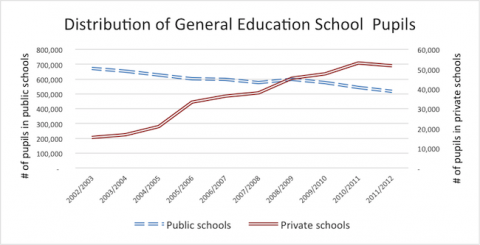 30
ივნისი
2022
30
ივნისი
2022
ISET ეკონომისტი
 სამშაბათი,
26
თებერვალი,
2013
სამშაბათი,
26
თებერვალი,
2013

 სამშაბათი,
26
თებერვალი,
2013
სამშაბათი,
26
თებერვალი,
2013
Not long ago I heard an interesting statement from an appreciated person about schooling. He said that the "one-size-fits-all" or "factory" model of schools was an inefficient use of the children's time. According to his opinion, homeschooling could be more effective and yield better outcomes than standard mass education.
There is no doubt that the school system children are exposed to have an impact on their developments, starting at a relatively early age. So the topic is important for every country, but in particular for a country like Georgia whose economic fortune crucially depends on the skills and qualifications of its population (in economics, we like to call this the "human capital"). Therefore I found it worthwhile to investigate the pros and cons of homeschooling from an economic perspective.
Homeschooling - also called home-based learning - is the education of children at home, typically by parents or by tutors, instead of classes in public or private schools.
In the developed world, homeschooling is becoming more and more popular. There are numerous reasons why parents choose to homeschool their children, but the most common is dissatisfaction with the way children are taught at public and private schools. Homeschoolers use a wide variety of methods and materials. There are different educational approaches, such as unit studies, unschooling, natural learning, and many others.
A study conducted in the US by Dr. Brian D. Ray of the National Home Education Research Institute surveyed 11,739 homeschooled students for the 2007-08 academic school year. The results showed that homeschoolers, on average, scored 37 percentile points above public school students on standardized achievement tests. This result is consistent with the Rudner study (1999). However, Rudner conjectured that these same students in a public school might have scored just as well because of the dedicated parents they had.
Generally, a big issue in economics is the tradeoff between efficiency and equity. Regarding the educational system, it looks as if the Georgian government emphasizes equity. Georgian law guarantees that everybody has equal access to the general education system, fully financed through public sources. But is general education efficient for every child?
In economics, it is a standard assumption that self-interested agents make decisions that maximize their personal outcomes. At least when the decision-maker has to bear the consequences of a mistake, this assumption arguably makes some sense. But who are those who have to bear the consequences of the schooling decision? Well, of course, the children, but they may not be sufficiently informed to evaluate their education, and of course they lack legal entitlement to enroll in schools. Instead, one could look at the parents’ decisions, assuming that parents have an interest that their children receiving the best available school education.
If one follows this argument, then the increasing number of private schools may indicate that parents do not hold the public school system in high esteem. According to official data of the Ministry of Education and Science of Georgia, the number of pupils in public schools more than doubled in the last several years, while at the same time the number of pupils enrolled at public schools shows a constantly declining trend (see chart).

Homeschooling is a legal option for parents in many countries, allowing them to provide their children with a learning environment outside of public or private schools. Legally this is an alternative in Georgia as well, yet we do not know how often this option is chosen.
For example, if a pupil gets homeschooled for the first six grades and then wants to enter a public or private school at the 7th grade without attending the first six grades again, this is possible. The pupil has to pass additional exams, so-called “external exams”, in order to be accepted. However, this seems to be a very rare case in Georgia, as it took me quite a while to get a confirmation of this arrangement from the Ministry of Education and Science of Georgia.
When making the decision whether to homeschool or not, one should also take into account the costs of homeschooling. As mentioned before, a key concept in educational economics is the notion of human capital. Education – investment in human capital - incurs costs, which are pretty high in the case of homeschooling. While more educated parents are better suited to teach their children, their time is priced higher on the labor market, and hence the opportunity costs of conducting private classes at home are also higher. On the other hand, the studies mentioned above suggest that homeschooling may be an excellent investment in the future of a child, yielding high returns later on.
Clearly, the Georgian educational system has severe shortcomings. Among others, these are revealed through the fact that most of the pupils have private teachers outside the school, in particular when they prepare for university admission. Shortly before they leave school, the pupils are forced to attend public classrooms while in fact, they are studying elsewhere the material which is necessary to pass the university entrance exams. Obviously, public schools are not capable of effectively preparing the pupils for university.
In this situation, homeschooling could be a supplement to the Georgian educational system. Many children that currently attend public schools could arguably greatly benefit from the teaching methods developed in homeschooling. It might be a good idea to encourage parents to homeschool their children and, if this is done in an orderly and qualified way, remove the burden to attend public schools for these children.





